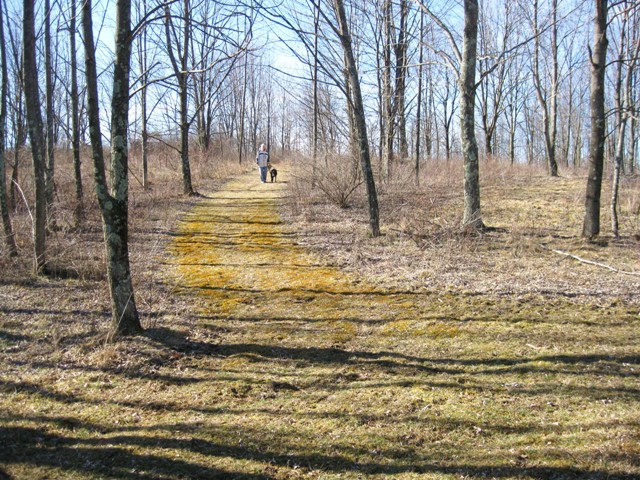
Weeks before Hunter’s 13th birthday on March 7, 2016, he and Donna walk along their favorite Trail; shows Greening Moss: photo by Rich Hill.
Despite the many wonderful things guide dogs can do for their blind handlers, they share a common flaw. Though they can find the post office, a seat on a train or deftly navigate a construction zone, they can’t live as long as we’d prefer.
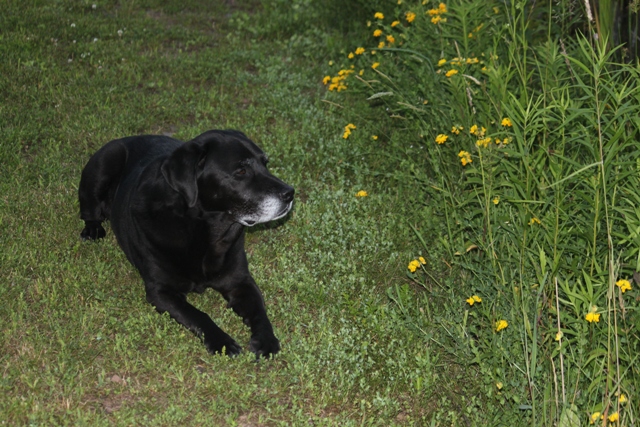
Hunter, Donna’s black Lab guide dog, on Hill’s Pond-Berm Trail with blooming yellow Birdsfoot Trefoil, Showing his Gray in Summer of 2013: photo by Rich Hill.
Hunter got sick a year and a half ago, and was ultimately diagnosed with Lymphocytic-Plasmacytic Enteritis (LPE, a form of canine Inflammatory Bowel Disease. Since then, people have been asking me when I would be getting a new guide dog. The issue comes up even more now that he’s thirteen.
Guide Dogs, Ownership & Retirement
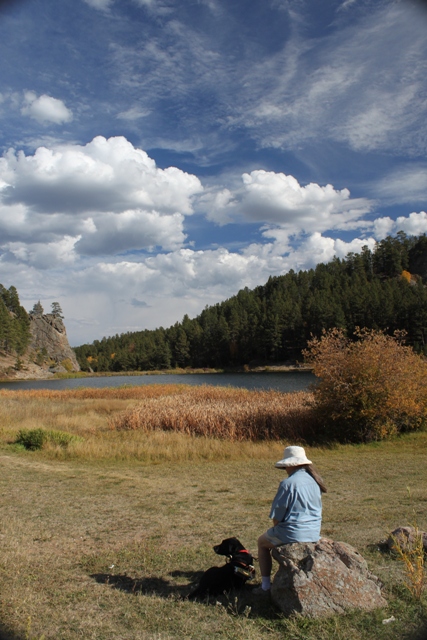
Donna & Hunter rest by a lake in South Dakota several years ago: photo by Rich Hill.
The Guide Dog Foundation for the Blind (Smithtown, NY), where I received all four of my furry helpers, is one of only a few schools which offer guide dog handlers full ownership of their dogs. Like many GDF students, I always opt in.
Despite having transferred all of the legal responsibility for the dogs to the blind owners, however, GDF is there with help and support throughout the life of the team. They, of course, help in the retirement process. The transition from one guide dog to the next is replete with many questions, unforeseen circumstances, and difficult decisions.
When Should a Guide Dog Retire?
Safety is the most important consideration. If a guide dog is, for any reason, no longer able to perform his duties, and it’s not a matter that veterinary care or further training can rectify, it’s time.
The dog’s health isn’t the only factor. Sometimes, the dog just slows down with age or shows signs that work is becoming too stressful. Since opportunities for independent living and employment for blind Americans are primarily in urban areas, many blind people live in cities, use public transportation and live in apartment complexes. This presents more and different challenges than living in a small town or — as we do — in the country.
Many handlers choose to retire their dogs in middle age. This is done for several reasons. Handlers need to take time off from work to train with a new guide dog. Having the flexibility to schedule something that works for the employer and GDF is preferable to being stuck in the city with no guide dog, waiting for a place on class and using alternate methods to go about one’s life. Furthermore, many people want their beloved canine friends to have a happy retirement while they are still healthy enough to enjoy it.
What Happens to Retired Guide Dogs?
Some guide dogs suddenly become ill and pass away. Most guide dogs, however, are retired in relatively good health. The blind person can keep the retired guide dog and get a new one at the same time. When we lived in Glenside, I knew a couple who each had a working guide dog. They also had a retired guide dog and a cat. They all slept together in a king-sized water bed.

3 Lazy Boys & 1 Lazy Girl: shows Donna, black Lab guide dog Hunter & rescued orange tabby Goofus in a Lazy Boy recliner: photo by Rich Hill.
Not everyone can, or wishes to, keep their retired dogs, however. Some people give them to their parents, other family members or friends that the dog already knows. Others prefer finding a country environment, where the dog has more freedom.
For those who need another option, GDF has a retirement program. The family who raised the dog as a puppy is usually given the option to take the dog back, and many do. If that doesn’t work, there is a long list of volunteer families ready to adopt retired guide dogs.
My Experience with Retiring My Guide Dogs: a Different Path
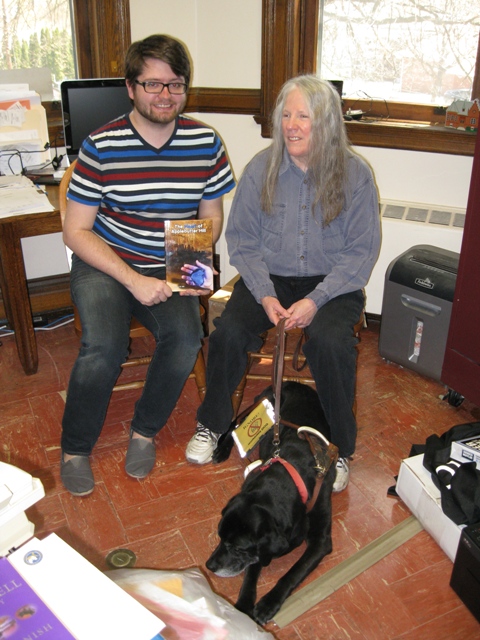
Donnna – with her black Lab guide dog, Hunter – donates The Heart of Applebutter Hill to Dir. Jesse Johnson of the Towanda Public Library: photo by Rich Hill.
I’ve never gotten a new guide until after the one I was with passed away. None of my dogs have ever left our home or my care. I understand why people have to do this and consider myself profoundly blessed that I have not had to, though it comes with its own challenges. It was less of a well-thought-out decision on my part than just the way things happened that got me started down this path.
Simba

Donna Sitting with her first guide dog Simba (a black Lab) in Tennessee’s Great Smokies National Park in ’81: photo by Rich Hill.
My first guide, Simba, was 13 and working well when he was diagnosed with lympho-sarcoma. I was a street performer in Philadelphia’s center-city train terminal Suburban Station. At the time of Simba’s diagnosis, there was a system-wide strike by SEPTA (the Southeastern Pennsylvania Transit Authority). Even if I could have gotten to center city, no one else would have been there. It was very liberating, and I never had to think of Simba’s condition as interfering with my livelihood.
At the time, the treatment, which our local vet warned us had more side effects than the specialists would acknowledge, offered a fifty percent chance of a remission lasting up to six months. Without it, they estimated that he’d have six weeks.
He had about two. Our vet put him to sleep in our back yard with Rich and I comforting him and a tape of Segovia playing.
“The best for the best,” as Rich said.
Curly Connor
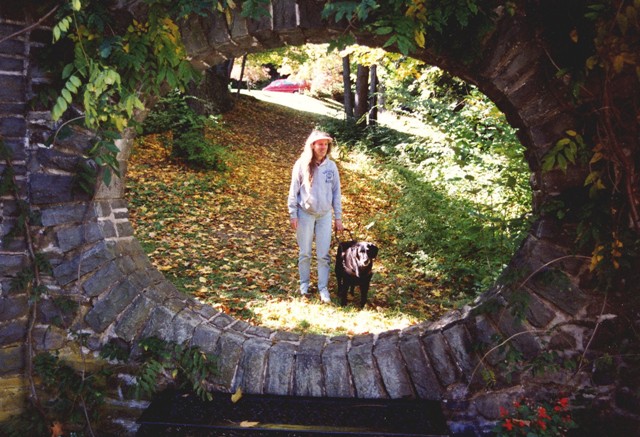
Donna & Curly Connor in opening of stone wall at Grey Towers National Historical Site (Milford, PA), mid ’90s: photo by Rich Hill.
The real Curly Connor, the half black Lab and half Golden Retriever upon whom Abigail’s guide dog in The Heart of Applebutter Hill is based, had sudden back end paralysis from a vaccination reaction at age 12. The vet thought it was arthritis, but I asked him to humor me and do an x-ray. He stood there clicking his pen and finally said that Connor had the hips of a 6-year-old.
With the help of Dr. Jean Dodds, a veterinary epidemiologist referred to us by Emily Biegel, our GDF trainer, along with a local neurologist, we got him passed that so that he worked for 2 more years.
When I retired him, Curly Connor would still go for walks with me. I didn’t work him; I was using my white cane. We’d get rides to school-assembly presentations from Rich, who had been laid off by then. This allowed Curly Connor to dress up like a guide dog and walk around for the kids, which he loved.
We were in Glenside by then and no longer street singing. Curly Connor died in our Living room at the ripe old age of 15. The vet who put him to sleep said it had been an honor to know and treat him.
MoMo
I deeply regret not having a picture of my eighty-pound black Lab/Golden Retriever tough guy, MoMo. Rich hasn’t yet digitized that part of his photography archives.
MoMo died suddenly at age 9, and we were living here in the mountains. I hadn’t yet transferred my school assembly skills to this area and was using him primarily for long walks. We knew he was aging rapidly, but tests weren’t showing anything. One day we woke up to an emergency. We rushed him to the vet’s, and he died while they were examining him. Later we learned that he had angio-sarcoma.
Hunter
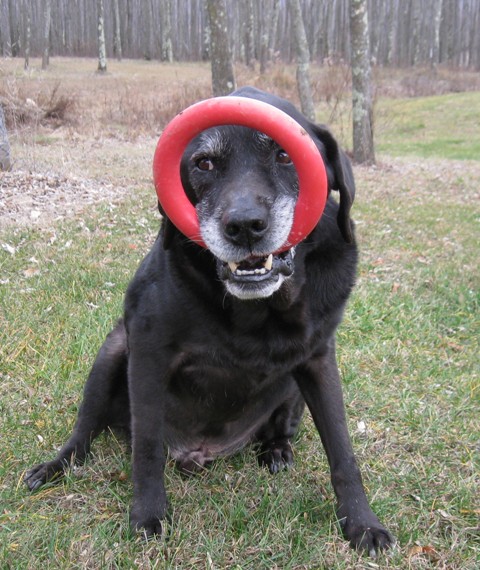
At 12.5, Hunter, Donna’s black Lab guide dog, found a new way to carry his red rubber Ring. It’s in his mouth but flipped up over his face: photo by Rich Hill.
Hunter has been essentially retired for a year and a half. He recovered from LPE, regained the twelve pounds he had lost and returned to what we called “modified assignment.” we took short walks on our trails here on the property, and Rich threw Hunter’s beloved red rubber ring to build up his strength. Until a couple of months ago, When we went out, he accompanied us and was still up to working in stores.
Recently, however, things have changed. Though he sees and hears as well as ever and his appetite remains as respectable as his breed demands, his strength is evaporating before our eyes. We have to lift him into our car, and when he plays with his red rubber ring, it’s more of a prance than a run.
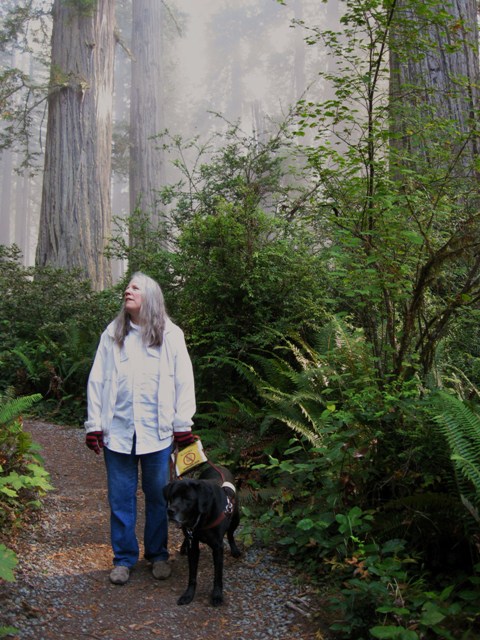
Donna & her guide dog Hunter walk along path in California Redwoods in September 2009. There’s a glowing mist: Photo by Rich Hill.
Yes, I miss our long walks. Nevertheless, I feel blessed that we are in a position to allow Hunter to spend his waning days or weeks or whatever it is with us, working when he’s up to it. Just as there will never be another Simba, another Curly Connor or another MoMo, I know that I can never replace Hunter either. I am, however, still blind. So, when Hunter is gone, I will get another guide dog, and we will give him all of our love.
Resources
Guide Dog Foundation for the Blind – providing guide dogs at no cost to qualified students
Dr. Jean Dodds
Dr. Jean Dodds’ Pet Health Resource Blog: Considered one of the foremost experts in pet healthcare, Dr. Dodds focuses on vaccination protocols, thyroid issues and nutrition. http://drjeandoddspethealthresource.tumblr.com/

Donna, this was such a beautiful tribute to your faithful guide dogs and friends. My heart broke each time I came to the end of their story but you handled each in such a special and heartfelt way. I have to admit I was sobbing at Momo’s passing. I’ve been back and forth on the issue of a guide dog and it’s good to hear that the school you use provides the option for the handler to keep the dog after retirement because if I ever go this route I would definitely want to keep the dog.
LikeLiked by 1 person
Steph, thanks. I could write volumes on each of them. The only thing worse than losing them is the thought of never having known them to begin with. It’s a big decision, so take your time and think it all through. My brother and sister-in-law decided to stick with their canes. It’s all about what seems right for you. Let me know if I can help in any way.
LikeLiked by 1 person
I was very close last year to making the decision, even talked to a school but then had a change of heart. My concern right now is that I have a pet dog and I love her to death but I’m nervous about getting emotionally involved with another animal and I understand the relationship with guide teams is even stronger. So I’m not taking the decision lightly it’s been something I’ve thought about over the last two years.
LikeLike
Steph, People do it – get a guide dog while they have a pet – but I think I’d have a tough time with that. I’m a one-dog-at-a-time sort of person. Maybe that’s you too, and maybe someday down the road it will work out for you to get a guide dog. As far as the relationship, my thoughts have always been that, if you love a dog, it doesn’t matter whether it’s a guide dog or a pet. Once you’ve given your whole heart, it isn’t going to be any easier to lose the dog just because they are a pet. There’s two things going on with guide dogs – the love and the function. I think that, as a guide dog handler, I may be more inclined to jump back in the pool, so to speak, because of the function. I can’t replace the person, but I also don’t want to live without the independence, help and companionship that a guide dog can give me. After four guide dogs, I have confidence that I can find another dog to love and re-establish a working relationship with.
LikeLike
Thank you for your story. I am struggling right now, a little differently than you and I struggle to move forward. I had a service dog for years when I finally made the decision to move to guide dog. My service dog stayed with me for three more years but slowly was moved to family and has a very happy retirement life, is still alive and doing well.
In June my guide dog and I spent 15 days at Disney by ourselves with my 10 year old granddaughter. We had such fun, rides, horse backing riding, archery, and shows. We came home and settled back into our routine. Late August I notice she was breathing very funny, a day later she was fine. A week or so later it happened again, but again next day she seemed fine. A week later 9/16/16 she was doing it again so I took her to the vet. She had ideopathic chycothorax, lymphatic fluid kept filling her lungs.
At my school I had the choose to own my dog, I had the paperwork but never filled them out. I was told I could keep her during retirement, and we could always be together if that is what I wanted, so I saw no need to own her, she was mine. Yet this disease was going to cost a lot, the first day we new she had her lungs drained of 3 liters of fluid, costing more than $1500, 5 days later we were back in for her liungs to be drained again, another $1500, and again 5 days later we were back again, another $1500. The school wanted her to go back to them they told me, but they sent her right to a hospital and never took her to the school, she spent two weeks being drained again because no surgeon could be found. She then had a $7000 surgery and 5 days later went back to the school.the school would not answer my questions how is she, can she work again, and can she come home. After three weeks I got an email that she was up for open adoption, before I emailed back and responded, she was already in another home, and it has been several days now and not one word from the new owners as to how she is doing. I feel so violated, she had a home here, I would have kept her, yes she has some medical issues but the biggest ones should be over, yet they never gave me any real words to that.
The day before I got the email she was being adopted, I got an email that my new dog would be coming. I am totally torn.i have less than a month. But to me, I need help from the school, this school has done nothing that it tells the public it does, it never came an visited us in 4 1/2 years, the. They did but with a promise to be back in a month and should up unannounced the day we were sitting I. The vet office being told the news. When I asked for graduate suppose with the lose, I got none, and no one has called me back. When I asked please just have the adoptive parents call me and let me know how she is doing, I get nothing.
I am like paralyzed, I feel I need a dog, or I can’t work and go one with life, I commute by bus, train and light rail 2 hour in and 2 hour out of the city daily. I just find it to hard with a cane. But with my retired dog gone the way she did, how do I trust the school, how do I bond with a dog that may be gone in a second, without being able to know how she is doing or where she is living. If I don’t trust and bond how do I make a new dog a team. I am so torn, if only they gave me the information, if only they told me why this was the best, if only they would let the new or make the new family call me, then I could get closure and move on. I just feel so overwhelmed, I really don’t know what I should do.
LikeLike
Dear MTG,
Thank you for sharing your story. I know it had to be difficult to do so. I am so sorry about the situation you find yourself in. This is not the first time I have heard of such a story, where a school has essentially ripped a dog team apart for no reason and has been unresponsive.
A few things come to mind. First, your efforts to find out about your dog have gone unanswered, so I would consider getting in touch with the local press in your area with the story, and seeing if they would be willing to look into it, as they often do with consumer issues. You could use this comment, editing it a bit to include the name of the school and people you contacted. You are under no obligation to save them from the embarrassment they ought to feel about this.
Second, if you ever get another dog, take ownership ASAP. At GDF in Long Island, NY, where I have been getting my dogs, they allow students to take ownership or custodial rights. In either case, they have been there to help, if needed, and I never heard of such a cruel and patronizing response to anyone I know who has received a GDF guide dog.
Your story also reminds me of my belief that all of the service dog organizations ought to form a veterinary health insurance pool to get lower rates, since many of us don’t have the resources to provide expensive healthcare for our dear friends. They could pay some of the premiums for at least some of the students. Frankly, if they cut back on some of their management staffing, they could probably provide insurance for all grads.
I would advise you to definitely get another dog somewhere, take ownership, and dedicate yourself to undoing the damage your current school has caused. The bond you had with your dog is why you worked well together, and you need to insist from yourself and your school that no one but you will have the ultimate authority to remove your new dog from your home. That is the only way your heart will be comfortable loving completely again. Help from the school must not be considered as a forfeiture of your rights as his or her caretaker.
Again, I am so sorry and saddened by this. Let me know how you are doing, and keep the faith. You might find it helpful to contact the hotline of the National Association of Guide Dog Users. At the very least, you could get their perspective and talk to someone who would have some understanding of your situation. Here’s the number.
Toll-Free 1-888-NAGDU-411
That’s (1-888-624-3841).
Or call 1- 813-658-5749.
Blessings,
Donna
LikeLike